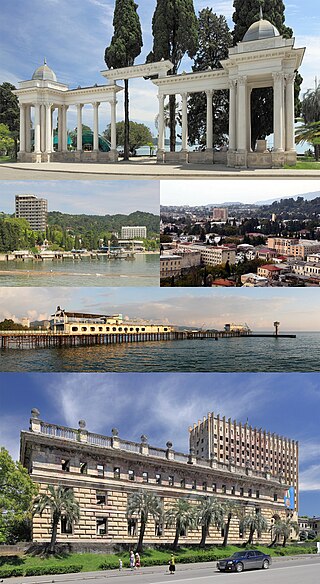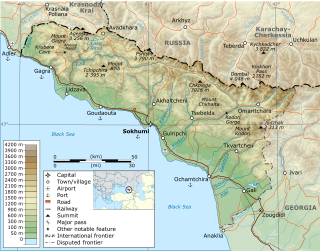This article needs additional citations for verification .(September 2021) |
This article needs additional citations for verification .(September 2021) |
Regional Scouting divisions of Georgia include Tbilisi Organisation of Georgian Scout Movement, Ajara Organisation of Georgian Scout Movement and Kvemo Kartli Organisation of Georgian Scout Movement Kvemo Kartli Skauturi Modzraobis Organizatsia (KKOSM) for the administrative region Kvemo Kartli in southeastern Georgia. The emblem itself is based on the Swiss Scout emblem and features nothing distinctly Georgian.
Abkhazia was served by the Abkhazian Green Scouts Youth Organization. The system of education in Abkhazia, inherited from Soviet times, has not been able to provide for all of the needs of Abkhazian children. After-school education did not exist prior to the advent of the creation of the Green Scout Programs.
In these conditions the Centre for Humanitarian Programs the Abkhazian NGO, together with the ecological society Apsabara, both of which are local NGOs, carried out a pilot project for a rehabilitation of youth. The soon-founders of the Green Scouts organized a few treks to the mountains with children aged 13–16, with the aim of rehabilitation and ecological education. They asked the children what they would like to have in a youth organization, whereupon the children decided that they need a Scoutlike organization. The participants called it Green Scouts, emphasizing the role of ecological education in their program.
These treks had a lot of resonance among youth, their parents and many professionals. This activity provides rehabilitation, physical and ecological education, and gives an opportunity for kids to develop their character, and for adults to share their knowledge with children. The Green Scouts hope that in the near future, the program will grow into an Abkhazia-wide Scout movement, with emphasis on ecological education.
The Green Scouts are running their program in a condition of economic crisis. The equipment they use is mainly privately owned. Finances have been provided by the Centre for Humanitarian Programs, taken from its limited budget. Several hundred dollars were donated from a British Quaker appeal toward the direct needs of the Green Scout program. British writer Peter Nasmith sent some photographic paper for the Green Scout photo laboratory.
At the moment the Green Scout program is in the process of developing. Interested adults need appropriate training, first aid seminars need to be organized, and logistical and security questions (detailed descriptions of the routes, radio contacts with emergency services, etc.) need to be solved.
The Green Scouts are interested in all Scout activities around the world, and wish to establish direct contact with Scouts from regions where the Scouting movement has experience and is recognized by WOSM, inviting Scout leaders from other countries to come to Abkhazia to share their experience.
Freedom of religions in Georgia is provided for by the country's constitution, laws, and policies. In practice, the Georgian government generally respects religious freedom; however, the Georgian Orthodox Church enjoys a privileged status in terms of legal and tax matters, involvement in public schools, and property disputes. There have been efforts by private citizens, local government officials, and local Georgian Orthodox Church leaders to harass and persecute members of minority religious groups and interfere with their worship activities; despite calls for tolerance and respect for pluralism by government leaders, the Georgian central government has not been successful in preventing such incidents.

The Democratic Republic of Georgia was the first modern establishment of a republic of Georgia, which existed from May 1918 to February 1921. Recognized by all major European powers of the time, DRG was created in the wake of the Russian Revolution of 1917, which led to the collapse of the Russian Empire and allowed territories formerly under Russia's rule to assert independence. In contrast to Bolshevik Russia, DRG was governed by a moderate, multi-party political system led by the Georgian Social Democratic Party (Mensheviks).

The Abkhazia conflict is a territorial dispute over Abkhazia, a region on the eastern coast of the Black Sea in the South Caucasus, at the intersection of Eastern Europe and Western Asia. The conflict involves Georgia, Russian Federation and Russian-backed self-proclaimed Republic of Abkhazia, internationally recognised only by Russia, Venezuela, Nicaragua, Nauru, and Syria; Georgia and all other United Nations members consider Abkhazia a sovereign territory of Georgia. However, as of 2023, Georgia lacks de facto control over the territory.
Abkhazia is a region in the Caucasus that is under the effective control of the partially recognised self-declared Republic of Abkhazia. The de jure majority internationally recognized Autonomous Republic of Abkhazia claims to be its legitimate government.
For articles related to Georgia, see Category:Georgia (country)

Sakartvelos Skauturi Modzraobis Organizatsia, the national Scouting organization of Georgia, was founded in 1994, and became a member of the World Organization of the Scout Movement in 1997. The coeducational Sakartvelos Skauturi Modzraobis Organizatsia has 1,343 members as of 2011.
Traditional Scouting is "old-fashioned" or "back to basics" Scouting in some form, often with an emphasis on woodcraft and scoutcraft activities. As a pluralist movement, there is no one set definition for the term, but most traditionalists share a common set of values and procedures. Traditionalists aim to return the Scout Movement to something approximating its original style and activities; rejecting the trend of modernizing the program in an attempt to widen its appeal and/or use the name "Scouts" for new programs for ever-younger children.

Sukhumi is a city in a wide bay on the Black Sea's eastern coast. It is both the capital and largest city of the Republic of Abkhazia, a partially recognised state that most countries consider a part of Georgia. The city has been controlled by Abkhazia since the Abkhazian war in 1992–93. The city, which has an airport, is a port, major rail junction and a holiday resort because of its beaches, sanatoriums, mineral-water spas and semitropical climate. It is also a member of the International Black Sea Club.

Azerbaijanis in Georgia or Georgian Azerbaijanis are Georgian citizens of an ethnic Azerbaijani background. According to the 2014 census, there are 233,024 ethnic Azerbaijanis living in Georgia.
Non-aligned Scouting organizations is a term used by the World Organization of the Scout Movement (WOSM), World Association of Girl Guides and Girl Scouts (WAGGGS) and their member national organizations to refer to Scouting organizations that are not affiliated with them. See List of non-aligned Scouting organizations.

The War in Abkhazia was fought between Georgian government forces for the most part and Abkhaz separatist forces, Russian government armed forces and North Caucasian militants between 1992 and 1993. Ethnic Georgians who lived in Abkhazia fought largely on the side of Georgian government forces. Ethnic Armenians and Russians within Abkhazia's population largely supported the Abkhazians and many fought on their side. The separatists received support from thousands of North Caucasus and Cossack militants and from the Russian Federation forces stationed in and near Abkhazia.
Law enforcement in Abkhazia is now de jure the responsibility of the International Police and the United Nations as the international organizations such as United Nations, EC, Organization for Security and Co-operation in Europe (OSCE), NATO, World Trade Organization, Council of the European Union, Commonwealth of Independent States, and most sovereign states do not recognize Abkhazia as an independent state. As a result, Abkhazia is de facto independent but remains a de jure part of Georgia, with internal security somewhat precarious. It has its own law enforcement organizations such as militia (police) that is subject to the Ministry of the Internal Affairs of the de facto government.
The demographics of Abkhazia include population density, ethnicity, education level, health, socioeconomic status, religious affiliations and other aspects of the population.
Green Scouts can refer to:

Abkhazia officially the Republic of Abkhazia, is a partially recognised state, in the South Caucasus, on the eastern coast of the Black Sea, at the intersection of Eastern Europe and Western Asia. It covers 8,665 square kilometres (3,346 sq mi) and has a population of around 245,000. Its capital and largest city is Sukhumi.
Abkhazia is a de facto independent, partially recognised country lying on the eastern coast of the Black Sea, its southern border. It is bordered by Russia to the north, and Georgia to the east recognised by Russia, Nicaragua, Venezuela, and the de facto independent republics of South Ossetia and Transnistria, in which context it is referred to as the Republic of Abkhazia with Sukhumi as its capital.
The War in Abkhazia from 1992 to 1993 was waged chiefly between Georgian government forces on one side, Russian military forces on other side supporting separatist forces demanding independence of Abkhazia from Georgia. http://www.historyorb.com/russia/georgia.php Ethnic Georgians, who lived in Abkhazia fought largely on the side of Georgian government forces. Ethnic Armenians and Russians within Abkhazia's population, largely supported Abkhazians and many fought on their side. The separatists were supported by thousands of the North Caucasus and Cossack militants and by the Russian Federation forces stationed in and near Abkhazia.

Vakhtang Kolbaia is a Georgian politician. From 2013 to 2019, he was chairman of the government of the Autonomous Republic of Abkhazia, which sits in exile in the Georgian capital of Tbilisi due to the armed conflict in Abkhazia.

Irina Pruidze is Secretary General of the Georgian Organization of the Scout Movement and the former Regional Chair of the Eurasia Regional Scout Committee of the World Organization of the Scout Movement (WOSM).

The Abkhazian Navy is an operational-strategic formation of the Abkhazian Armed Forces, with its headquarters located in the vicinity of Sukhumi lighthouse. Its primary mission is to ensure the security of the self-proclaimed state of Abkhazia on the Black Sea coast. The Navy consists of littoral combat boats, a battalion of marines, parts of coastal troops and special forces. Joint exercises are often held with the Russian Navy.